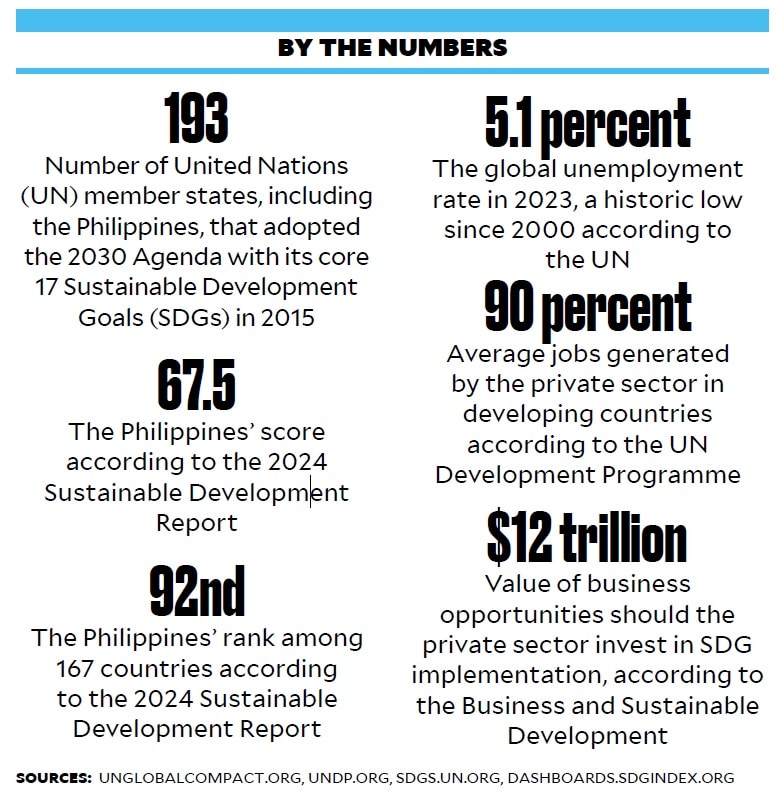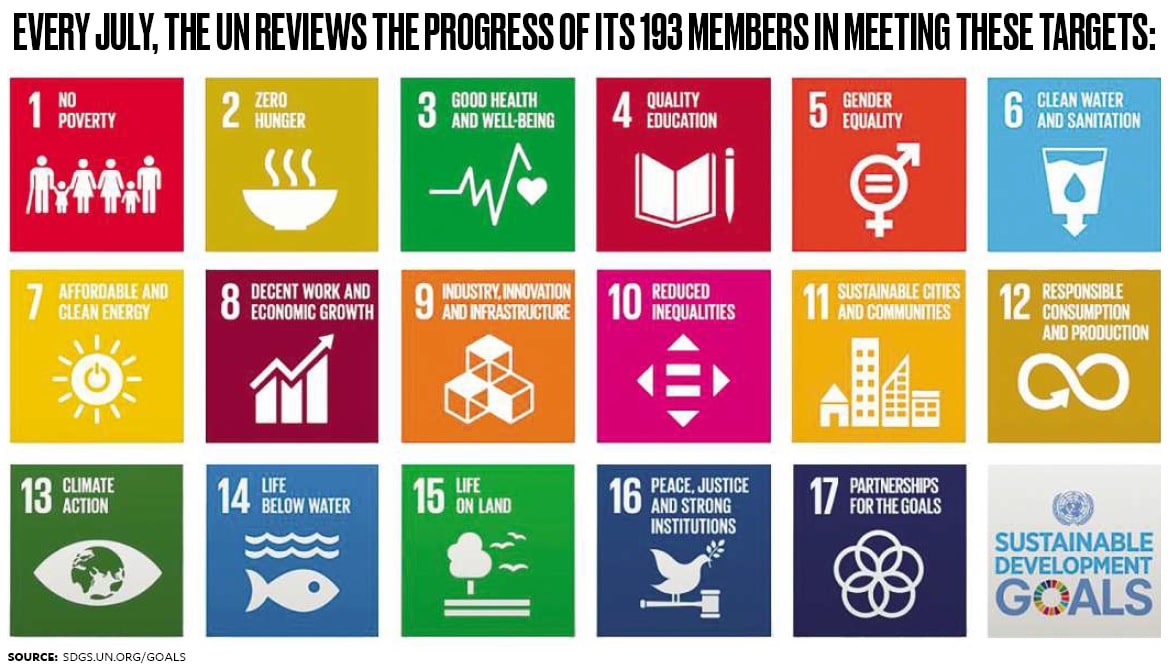17 Sustainable Development Goals: Where are we at?
Launched in September 2015 by the United Nations (UN) Summit in New York, the 2030 Agenda for Sustainable Development is a 15-year plan grounded in the Universal Declaration of Human Rights aimed at ending poverty in all forms across the globe, envisaging “a world of universal respect for human rights and human dignity, the rule of law, justice, equality and nondiscrimination.” It was launched following the end of the Millennium Declaration, which ran from September 2000 to 2015, driven by the Millennium Development Goals.
The 193 UN member states—including the Philippines—adopted the 2030 Agenda along with the main core of its plan: the 17 Sustainable Development Goals (SDGs) which cover poverty, hunger, inequalities, peace and justice, among others. These 17 goals are aimed at developing all countries toward improvement through global partnership.
All governments and sectors in society have an important role to play in carrying out the fulfillment of these SDGs. The UN also highly encourages and requests companies around the world to participate through responsible business practices, and by pursuing “opportunities to solve societal challenges through business innovation and collaboration.”
Progress on the SDGs is reviewed every July during the UN High-Level Political Forum on Sustainable Development, which is under the auspices of the UN Economic and Social Council. At these forums, countries present their Voluntary National Reviews (VNRs) as well as actions they intend to take, or are already taking, with regard to SDGs.
As of July 2023, more than 150 countries had submitted their VNRs. The UN also puts out a Sustainable Development Report every year to review overall progress, which also has a ranking of countries in terms of SDG progress.
Finland, currently the leading country in the 2024 Sustainable Development Report, adopted a national implementation plan aligned with the SDGs in 2017. Its 2017 report built on carbon neutrality and resource responsibility, as well as combating discrimination. The government adopted a new action plan related to SDGs in 2020, building on creating “an ‘Inclusive and competent Finland—a socially, economically and ecologically sustainable society’ that also shoulders global responsibility for sustainable development in the poorest of nations.” The country also houses the Finnish National Commission on Sustainable Development, which strives to promote and integrate SDGs and their strategic objectives into national policy, administration and practices.
Article continues after this advertisementLast September 2020, CEOs from over 100 countries also signed a Statement from Business Leaders for Renewed Global Cooperation in support of the UN and the SDGs.
In the Philippines, the National Economic and Development Authority (Neda) reaffirmed the country’s commitment to pursuing the SDGs in 2023, particularly through the formation of the Philippine Development Plan 2023-2028, aimed at inclusive growth and economic and social transformation. Neda Secretary Arsenio Balisacan also cited the creation of the Stakeholders’ Chamber as a way of collaborating and engaging with various sectors of society, as well as a Subcommittee on the SDGs under the Development Budget Coordination Committee. To help monitor the country’s SDG progress, Balisacan highlighted the development of the Nationally Determined 2030 Targets for the SDGs, which creates a supporting accountability mechanism.
The move toward integrating environmental, social and governance (ESG) goals with the UN SDGs reflects a growing recognition that corporate strategies must address global challenges such as poverty, inequality, climate change, environmental degradation, peace and justice. Achieving such alignment requires organizations to evaluate how their operations and value chains contribute to the larger global agenda for sustainable development.
ESG goals also place emphasis on a company’s responses and actions toward environmental concerns such as climate change, waste management and carbon footprint; social concerns such as labor practices, human rights, and community development; and governance concerns such as board composition and diversity, executive compensation, and shareholder rights.
Carrying out ESG goals directly coincides with fulfilling SDGs across several categories. For instance, the ESG goal to focus on energy efficiency supports and complements SDG 7, the goal for sustainable, affordable and clean energy, and SDG 13, which seeks to take action against climate change. The social aspects of ESG goals also complement SDGs 5 and 8, which aim for gender equality and decent work and economic growth. (See graphic for the 17 Goals.)
Efforts to connect and fulfill the two have also taken place within the Philippines. Through the United Nations Sustainable Development Cooperation Framework, the Philippines has formed a partnership with the UN to accelerate progress toward the 2030 Agenda. It outlines three strategic priorities and outcomes for the period 2024 to 2028: human capital development, inclusion and resilience building against economic, climatic, disaster and public health risk through improved access to and use of quality social services; sustainable economic development, decent work and innovation, so that all people may benefit from “a more integrated, innovative, inclusive and sustainable economy that generates decent work and livelihood opportunities”; and climate action, environmental sustainability and disaster-resilience where all people benefit from “low-carbon, climate-resilient development.”
The Joint Steering Committee, co-chaired by the secretary of Neda, the secretary of the Department of Foreign Affairs from the government side, and the UN-Resident Coordinator, acts as the highest governing body to provide oversight and support, and will review progress, identify new opportunities, and make necessary recommendations for pursuing these goals. With the partnership of various major departments and organizations such as the Philippine Statistics Authority, the Department of Justice, the Department of Social Welfare and Development, and the Department of Environment and National Resources, the framework sets specific performance indicators and clear means of verification and data sources to help steer the country toward fulfilling its SDG and ESG related responsibilities.
But despite the plans and goals that have been laid out across the years, it seems that progress has started to stagnate. A UN report from June 2024 found that the world was falling behind in following the SDGs, due in part to funding shortfalls, geopolitical tensions, and the COVID-19 pandemic that befell the globe only five years after the 2030 Agenda was implemented. The Sustainable Development Report for 2024 found that most of the Agenda’s targets showed “limited or a reversal of progress.”
Among the 167 countries graded according to SDG-related progress for 2024, the Philippines ranked No. 92.
But not all hope is lost. With plans and goals still set for the time remaining, achieving sustainable development for the Philippines and the world may yet happen—if all stakeholders come together and put more serious, determined effort on this monumental work.—Inquirer Research
Sources: unglobalcompact.org, sdgs.un.org, esgresearch.pro, sustainometric.com, undp.org, coe.int, un.org, sdgfund.org, reuters.com, dashboards.sdg.index.org, pdp.neda.gov.ph, neda.gov.ph, julkaisut.valtioneuvosto.fi, kestavakehitys.fi, thomsonreuters.com, philippines.un.org
Source: sdgs.un.org/goals

